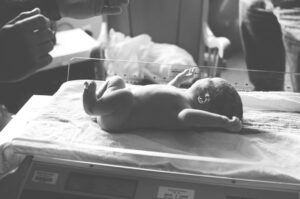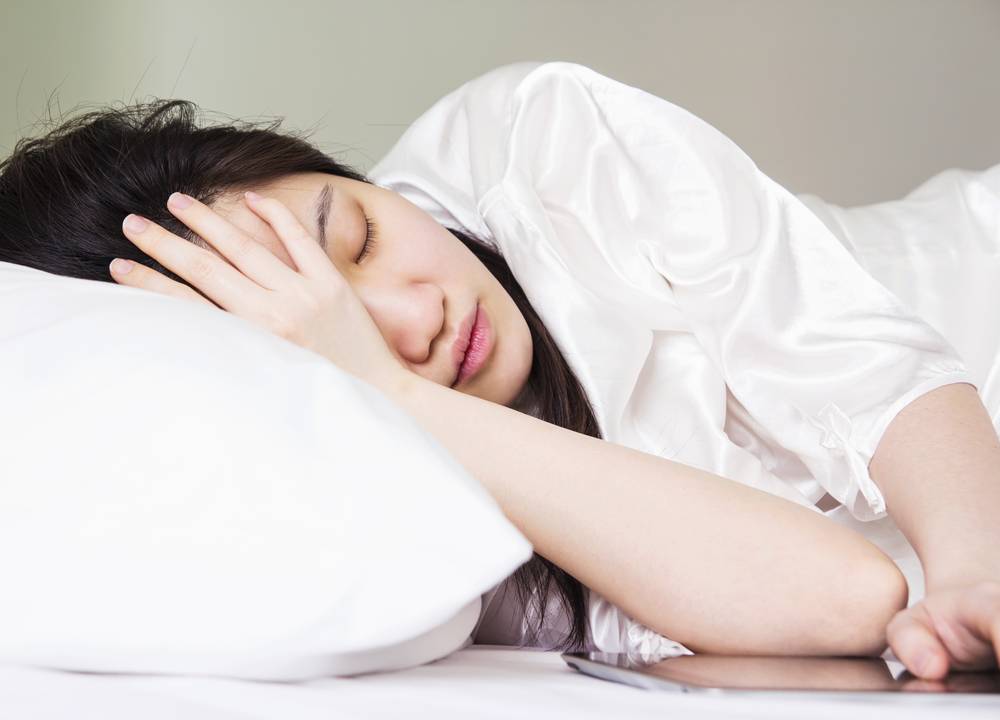
Understanding NAS: When Babies Experience Withdrawal
Learn about infant opiate withdrawal symptoms, diagnosis, and modern treatments. Find support for mothers and babies affected by NAS.

December 5, 2016
I began with blacking out by accident but by the end I wanted to get to that place.
Woman lying in bed, covering face with hand.
When I came to, I was pounding on the door and ringing the bell even though it was obvious my roommates weren’t home. I slid to the floor. My knee brace was digging into the back of my leg; as I readjusted it, my leg throbbed painfully. I injured myself earlier that week and had the brilliant idea to go out drinking, without crutches. I couldn’t remember getting home and had no idea what time it was. I was sitting on the dirty carpet of the apartment entrance with my legs sprawled out. I searched for my keys over and over again, mainly because I kept forgetting if I had already looked for them. I frantically looked for my wallet or phone but they were gone. I didn’t even have my coat.
I couldn’t remember anything after my first shot at the bar. Before that I had a couple drinks at a friend’s house, but the rest of the night was lost to me. It wasn’t the first time I drank so much that I couldn’t remember what happened, but it was the first time I woke up outside my front door. I forced myself off the floor and went to look for help. I hobbled around the city looking so distraught and haggard that a homeless woman asked me if I needed help.
A blackout is drug-related amnesia. Binge drinking can lead to memory loss and make it difficult to form new memories. Someone in a blackout might turn into an incoherent version of Dory from Finding Nemo who won’t stop repeating the same phrase, but a lot of the time it is difficult to tell if someone is blacked out. They may appear coherent and less intoxicated than they actually are, but they will forget all about their promise to hike the Appalachian Trail with you next summer. The ability to store new short- and long-term memories is inhibited during a blackout.
Metaphorically, what happens in a citywide blackout is the opposite of a drug-related blackout. In an electrical outage, the lights are out and people are home. In a drunken amnesia, the lights are on but no one is home. Like that scene in Home Alone where Kevin McCallister uses props to make it look like his family was at home partying, everything a blacked out person is doing seems normal but they aren’t saving those memories. This kind of memory failure is called a complete or en-bloc blackout. Then there are “brownouts” where the drinker remembers only fragments of their drunken antics.
A blackout is not the same as passing out. When someone passes out, they lose consciousness or fall asleep. Someone in a blackout is conscious and can do all the same things they could do if they were not blacked out. The difference between a non-blackout drunk and a blackout drunk is that the latter won’t remember anything the next day.
There is no simple equation to predict with certainty whether any one individual will experience a blackout, because alcohol’s effects depend on a complexity of physiological factors.
We have to look at how memories are formed to understand the mechanisms behind a blackout. Memory is formed in three steps. First, the event is experienced and the brain interprets and encodes that event. Next, the stimuli are stored for safe keeping. Lastly, the memory is retrieved when recalling the experience. Short-term memory does all of this in a matter of seconds. Short-term memories are then either discarded or stored as long-term memories.
Alcohol acts on receptors in the brain to block the neural signals for memory formation. Booze screws up the encoding process by incorrectly writing important contextual information. In a brownout, the context has been corrupted during the encoding stage. If the right contextual information is provided, it is possible that a previously misfiled memory can be reshuffled into its correct place.
There are other factors contributing to alcoholic memory loss and problems can occur at any time during memory formation and retrieval. Trying to recall events that occurred during an en-bloc episode is not possible, and scientists are still figuring out why. One thing science does know is that “a high frequency and volume of alcohol use is the single factor most closely related to experiencing blackouts.”
Anyone who binge drinks is at risk. Binge drinking, as defined by the National Institute on Alcohol Abuse and Alcoholism, is rapid alcohol consumption that raises blood alcohol concentration (BAC) to 0.08 percent or higher. Legal BAC levels are determined state by state, but all 50 states have set the legal limit at 0.08 or lower. Alcohol has obvious immediate effects on the brain resulting in loss of coordination, distorted vision, reduced inhibitions, memory problems, impaired reflexes, and slurred speech. Around a BAC of 0.08, the impairments become dangerous. At 0.16 or above, blackouts are more likely to occur. It isn’t all about BAC levels; genetics, mental health, and physical health are all influential factors. The more blackouts a person experiences, the more likely they are to have one again.
In 2002, Duke University looked into the issue of excessive drinking. They surveyed 800 students who reported having consumed alcohol at least once. Fifty-one percent of those said they had experienced one or more blackouts. Another 2004 Duke University survey found that 12 percent of those who reported drinking within the previous two weeks had blacked out. According to a study published in the American Journal of Psychiatry, a lot of college-aged blackouts can be attributed to inexperience. Social drinkers who drank too much too fast and usually didn’t eat enough subsequently suffered an alcohol blackout. Blackouts were not found to be an inherent component of alcoholism, although long-term heavy alcohol consumption was correlated with a higher likelihood of blacking out.
In the United States, binge drinking is not uncommon. An estimated 16.6 percent of the adult population engage in this behavior four times a month. In college I didn’t drink all the time, but when I did I binged. My friends and I would pre-game before we went out by drinking a lot of alcohol at home to get a cheap buzz. Then we would go to a party or the bar, where we continued to knock back drinks. When I was a 21-year-old woman in college, I weighed in at 140 pounds. According to science, four vodka shots in two hours would have easily raised my BAC to 0.13. Around that level, memory takes a serious hit.
During my drinking tenure, I blacked out more times than I can count. I rarely knew when to stop. I did have fleeting concerns about my frequent blackouts being a warning for the far off future. It never crossed my mind that I might already be out of control. I was trying to fit in, and I thought all the people I knew got blackout drunk. I realize now that I never asked that question, because I would rarely admit that I couldn’t remember. If I didn’t want to know—and I often didn’t—I just avoided anyone who was likely to tell me what I had done. I wanted to erase everyone else’s memories of the night before.
I thought of it as a win when I woke up with complete recall of my last binge. A victory to be able to drink myself into oblivion, act on all my compulsive urges, and remember the inebriation. If I didn’t black out I tended to make fewer stupid decisions, but nothing could stop me from sending drunk messages. It became a morning ritual to delete all of my recent messages so I could more easily ignore the embarrassment.
My tendency to black out fed into a black hole of denial. I stopped trusting myself to know what was real. When I was physically assaulted by an abusive partner, he told me it was my fault. He said I was “acting crazy,” and even though I remembered every detail of each attack— most of which I was sober during — I still believed his story over mine. My college drinking days trained me well in the art of denial. After all, I did sometimes get wasted and forget what happened.
In my final months of drinking, I would hide under the covers for days, dying to erase the awful things I had said and done when blacked out. My depression and anxiety worsened in tandem with my alcoholism. Funny stories of trying to become best friends with everyone at the bar turned into horrifying anxiety attacks. Embarrassing tales of passing out with my heels and dress on became waking up in a stranger’s house.
I began with blacking out by accident, but by the end I wanted to get to that place. A barely coherent journal entry from my last year of drinking declared, “I’m freaking out. I’m fucking shitfaced and want to be drunker. I just want to forget it all. I fucked up. But I’m honest about my escapism.” My drunken behavior was completely at odds with who I believed myself to be. I was the wasted case of Dr. Jekyll and Ms. Hyde.
I don’t know if my blackouts turned on the denial switch or if I was always trying to manufacture reality. Either way, they fed on each other. Taking the alcohol out of the equation has left me with a mess of falsely encoded memories that will take time to sort. In my experience, blackouts are terrifying. The psychological consequences of them can reverberate through a person’s life and discolor their perception of reality, even when clean and sober.
If you or someone you know is struggling with drug or alcohol abuse and in need of detox treatment in West Palm Beach, give Summer House Detox Center a call at 800-719-1090 to schedule a FREE consultation. You can also visit us at 13550 Memorial Highway Miami, FL 33161. We are open 24 hours a day, 7 days a week.

Learn about infant opiate withdrawal symptoms, diagnosis, and modern treatments. Find support for mothers and babies affected by NAS.

Unlock lasting freedom! Learn the true methadone detox success rate, compare treatments, and find your path to recovery in Miami.

“Rapid heroin detox”: Safe or myth? Learn the dangers, costs, and why anesthesia-assisted detox is ineffective. Find proven alternatives.
For immediate assistance, please call our Admissions Specialists at 800-719-1090.
Speak With A Qualified Addiction Specialist 24/7